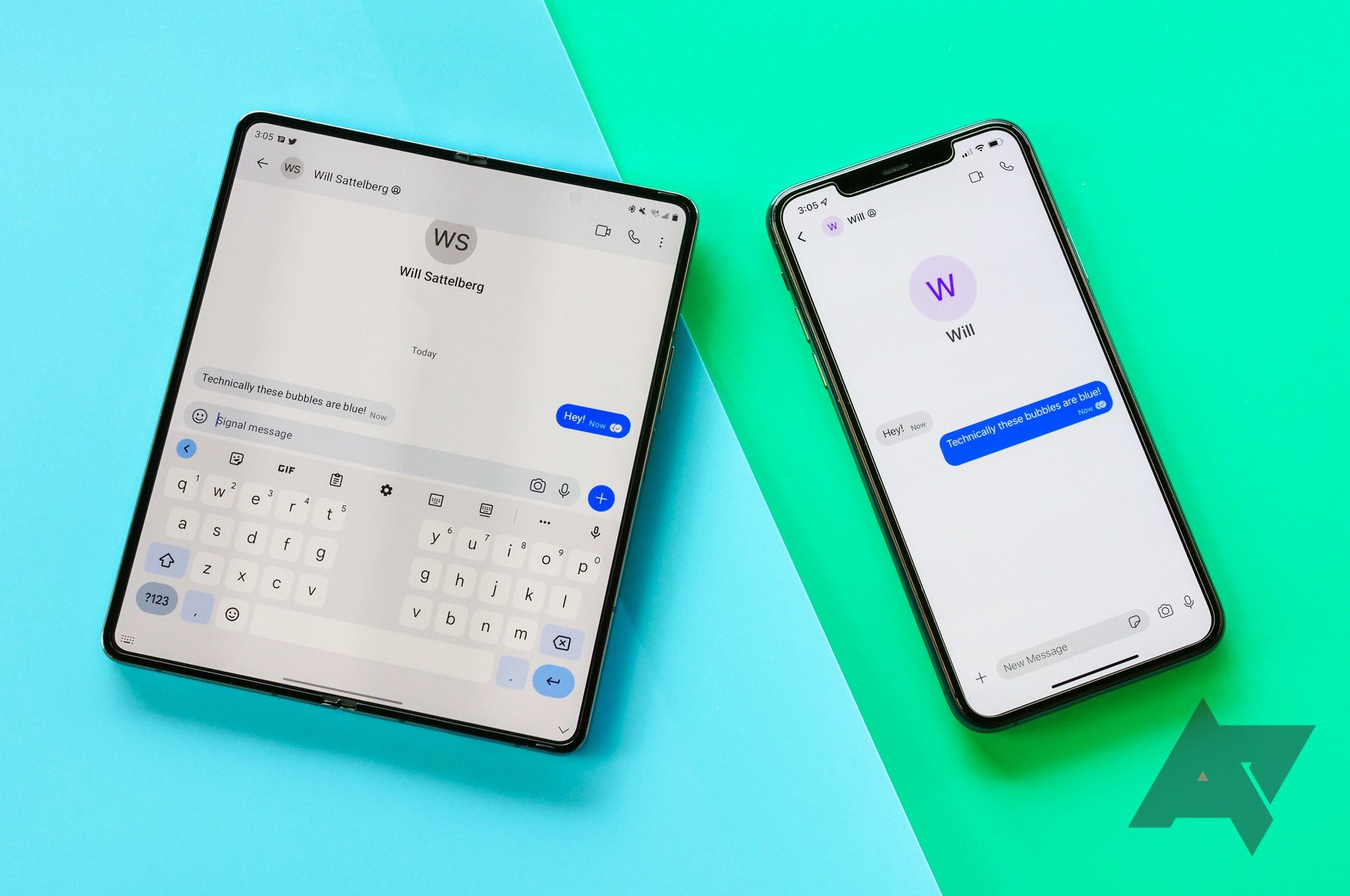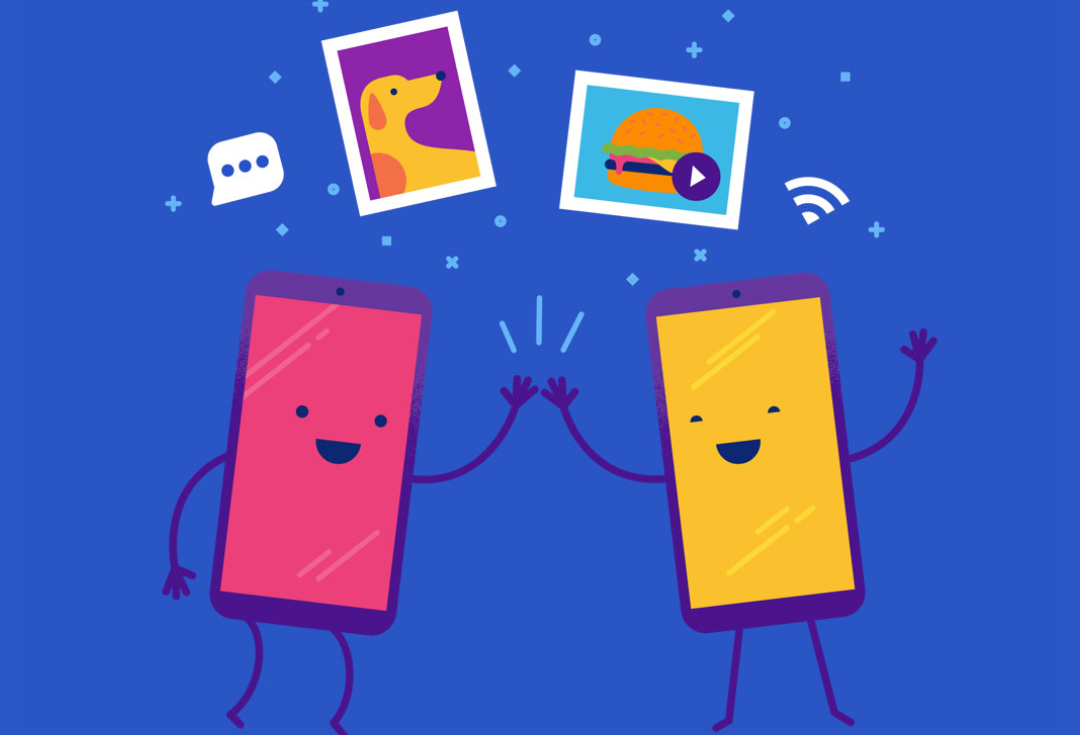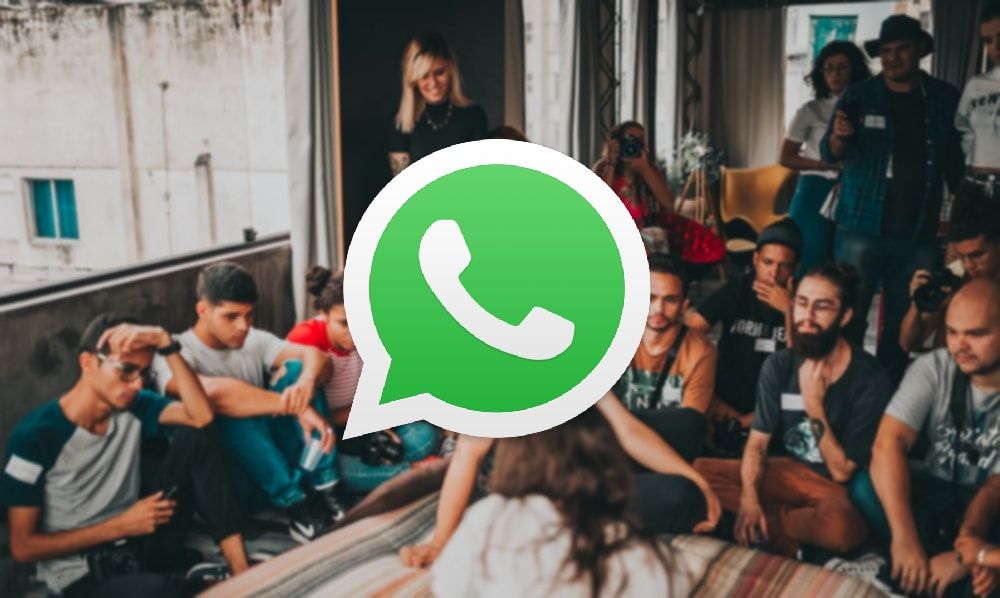Google wants RCS (Rich Communication Services) to be the de facto messaging standard for the best Android phones and iPhones. But the company needs Apple to adopt RCS for iMessage to achieve this. To meet its goal, Google has been publicly shaming Apple and running campaigns to pressure the latter into adopting RCS as a fallback for iMessage. On its part, Apple is holding back messaging progress worldwide with iMessage and creating a privacy disaster by using SMS as a fallback. But there's more to this story, and Google's intentions are not as noble as it seems.
Google wants to help Apple transition to the SMS-replacing standard as a backup for iMessage. And while Google might have won the RCS wars on Android, the future of the messaging standard is still up in the air, as much because of Google as it is because of Apple.
What is RCS?
RCS messaging is a complicated subject, mainly because there are multiple implementations. In general, as this discussion applies, the only important one is Google's Chat. It's the RCS system that "won." (Not Hangouts Chat. That other Chat. Google's bad at naming things.)
RCS is a set of standards developed by the GSMA (the Global System for Mobile Communications, which represents mobile carriers worldwide and establishes the standards they use) for enhanced mobile messaging. With it, you can send messages and media (such as photos and videos) at a higher quality between devices with benefits like reactions and typing indicators. It even operates with any data connection, including Wi-Fi. It brings all the benefits of not-so-modern instant messaging to replace the aging SMS standard.
There are several RCS implementations (the carriers tried and failed to spin up their garbage, locked-in versions), but the most important one to know about is the Universal Profile. It's the best version with the most beneficial features implemented to a specific set of agreed-upon standards. Most importantly, it encourages interoperability.
RCS can work in a decentralized manner, allowing carriers and companies to spin up their separate servers that don't talk to each other. A good Universal Profile implementation means these distributed systems can intercommunicate, so a message sent on a Random North American Carrier can be received by Destination Japanese Carrier. Networks still need to build that interoperability.
As far as we can tell, the Universal Profile spec doesn't require it, but this version makes that easiest. If these separate systems do things right, even if customers are on separate servers, they're all part of the same network.
Google's Chat is the company's take on a Universal Profile RCS system, ripped away from the carriers who had nearly a decade to get it right and refused to. No one wanted a single, centralized solution under one company's control, but it's the answer we got when the children at AT&T, T-Mobile, and Verizon refused to play nice with each other. All the carriers gave up and have since left it in Google's hands, abandoning their half-baked, too-late joint venture.
Google Chat requires Google's Messages app to work but doesn't require a carrier that supports Universal Profile standards for messaging. It's cleverly done. If a carrier supports Universal Profile, the Google Messages app uses that, and everything works as expected through the carrier's servers. If a network operator doesn't support it or has a locked-down system, Google circumvents it entirely, giving you RCS through its Jibe servers.
When Google rolled out Chat widely without waiting on the carriers to get it right, the carriers exited the conversation entirely, and now it doesn't matter what they do. Because of Google, everyone with an Android phone willing to use the Messages app can access RCS messaging in a full Universal Profile implementation.
Google has been pushing RCS messaging with the Chat moniker all these years. This created a branding mess since the company already offers Google Chat for team and business communication as a part of Workspace. However, Google seems to have realized its mistake. In a recent Google Messages beta build, the company was spotted rebranding the RCS based-messaging to what it is: RCS chats or simply RCS. Dropping the Chat moniker would do the messaging standard a world of good and avoid confusion with the other Chat.
What is Google's perspective?
The history of RCS may not have started with Google, but it ends with it. Google delivered the version of RCS messaging most customers experience through Chat and the Messages app.
RCS messaging is possibly Google's last hope for an iMessage competitor. Make no mistake. It is not an iMessage replacement. It doesn't have the same sort of feature set, and you cannot install a Google Chat app on your desktop computer and magically get an RCS-based iMessage replacement.
On PC, the closest thing we have is Messages for web. But it's not a great experience, with an awkward setup process, single-device support, and no real desktop experience since it's a web app. And worse, it's all tied to a phone number. Although, newer Universal Profile specifications allow that to be decoupled, relying instead on an OpenID.
Whatever Google's motivation is behind pushing for RCS, there are some benefits to customers. Excluding all the improvements in utility (writing indicators, read receipts, high-quality media, support for any data connection, and better group chats), RCS is more secure than SMS, which it supersedes. RCS also supports encryption for one-on-one conversations, enhancing customer privacy and security. At I/O 2022, Google confirmed it would bring end-to-end encryption to group chats in Google Messages, with the feature rolling out on the beta channel in December 2022.
Using RCS on Android is not as straightforward as iMessage on an iPhone. There are a lot of ifs and buts involved. So, if you're confused about how to use RCS, check out our guide on how to enable and use RCS chat in Google Messages.
Since the beginning of 2022, Google has been bashing Apple's lack of support for RCS, highlighting the social bubble effect and the bullying the company claims it imposes.
In June 2022, following the release of Drake's seventh studio album called Honestly, Nevermind, with one of the songs titled Texts Go Green. Google's social media team used the opportunity to drop an unofficial lyric explainer video on various social media platforms about what the green text means for an iPhone user.
Then in August 2022, Google launched a full-blown campaign to pressure Apple into adopting RCS for iMessage with its Get The Message website. A few months later, Meta-owned WhatsApp joined in on bashing iMessage for its lack of features. A billboard displayed at Penn Station in NYC mocked the ongoing green-bubble-blue-bubble debate, suggesting people switch to WhatsApp's private bubble.
Toward the end of the year, Google celebrated the three decades of SMS by listing the three reasons to switch to RCS. And in its blog post on The Keyword, Google again mocked Apple by calling it out as being the only company not to adopt RCS and delivering iPhone users a messaging experience from the 90s.
But separately from Apple's ecosystem lock-in, Google SVP Hiroshi Lockheimer highlighted a critical fact, which we wrote about in 2020. If Apple cared about customer privacy, it would support RCS as a fallback mechanism for iMessage rather than pushing all its customers to insecure SMS-based messaging.
iPhone is the most popular smartphone in the U.S., but that's not the case worldwide. And by not supporting RCS in iMessage, Apple is ignoring the privacy and security of its iPhone-using customers when they communicate with the world at large.
Whether you accept that claim or not, Google would stand to benefit if Apple adopted a Universal Profile-compatible RCS messaging standard on iPhones. RCS implements many of the best features in iMessage. Android customers would get a better experience communicating across the aisle with iPhones, reducing the effect of Apple's messaging lock-in and potentially swinging over customers who only stay for the blue bubble.
Until Google successfully pushes Apple to adopt RCS for iMessage, it is implementing other workarounds to make texting less terrible between iPhone and Android. The company updated Google Messages in November 2021 to add support for iPhone reactions by translating iMessage reactions to something recognizable on Android.
Then, in late September 2022, Google rolled out the ability for Android users to react to texts from iPhone users. The funny thing is that this turned the table on iPhone users. For years, Android users received unwanted messages whenever an iPhone user liked their message.
The story is now the opposite. Every time an Android user likes a text sent by an iPhone user, the latter receives an annoying "xxx liked this message" text.
To Apple's credit, it improved the Messages app in iOS 16 to ensure that adding Android users to a group text will not cause Tapback spam.
What is Apple's perspective?
iMessage is one of Apple's biggest sources of ecosystem lock-in, especially in North America. The conflict between blue and green bubbles has been brewing for over a decade, as the limitations of SMS and MMS slowly pushed iOS users to leave Android devices outside their group chats. And it's easy to see why.
SMS is ancient technology in the mobile world, lacking features we now consider essential for messaging, including read receipts, typing indicators, and high-quality media.
Forming an iOS-only group chat in iMessage isn't just a better experience. It's night and day, the difference between communicating like you're rocking a Moto Razr in 2006 and talking to your friends in 2023. And because iMessage is automatically available on every Apple device (iPhones, iPads, Macs, and Apple Watches), there's no onboarding process and no app to download. Its user base expands naturally, without any effort from the company behind it.
Apple could solve the green bubble issue at any moment with a simple iOS update. Adding RCS support to iMessage — even as a fallback, as the app supports SMS and MMS—would allow Android and iPhone users to communicate using features we now consider essential.
Sending a photo to your iPhone-owning friends in a reasonable quality would no longer require sharing a Google Photos link, and read receipts would update everyone in a conversation on who's seen what. All of those iMessage-exclusive features — Animoji, mobile payments, and more — would remain locked to Apple's devices, but the overall situation would improve for everyone.
That would also reduce the divide between blue bubbles and green bubbles, and therein lies the problem. Even if iMessage wasn't necessarily built from the ground up to become a way to lock users into Apple's devices, it's certainly grown into one. If you live in the United States or Canada, you may know people who switched from Android to iOS, usually due to green bubble conflict with their friends or family.
This is especially true with younger users, people in their teens or early twenties who experience social pressures and, in some instances, outright bullying when they aren't using iMessage. Whether it's iPhone-owning parents picking up a matching smartphone for their teens or friends at school mocking those who cannot access those exclusive messaging tools, the effect is the same: iPhones flying off store shelves.
Apple is aware of how advantageous iMessage remains for selling new iPhones. In 2013, SVP of Software Engineering Craig Federighi admitted as much in an email while discussing the possibility of an iMessage client for Android: "iMessage on Android would simply serve to remove [an] obstacle to iPhone families giving their kids Android phones." And then there's also the fact that Apple has no incentive to make iMessage work better with Android.
Is it possible to find a workaround for accessing iMessage on Android or RCS on iOS?
While no RCS or Chat clients are available on iOS, several iMessage clients are available for Android in the Play Store. Each requires an always-on server running on a relatively recent Mac device to forward and send messages between your Android phone and other compatible gadgets. AirMessage is the most popular of these apps, though there's a variety of alternatives online.
While such apps work, they aren't ideal. In addition to privacy concerns, you won't have access to those Apple-exclusive iMessage features. While AirMessage presents you as a blue bubble in chat, it doesn't add much outside of improved group chat and media support. You won't even see typing indicators when chatting with friends. This is a serious drawback compared to the usual experience iMessage provides.
Conversely, there aren't any solutions we know of that bring RCS messaging to iOS, and it's likely that only Apple can bring that functionality to the iPhone. iOS and Android work differently. Where Android allows you to swap apps at will (and install them from anywhere you want), Apple forces you to use its apps for certain things, one of which is SMS. Apple's Messages app is your only choice.
Could Apple be forced to support RCS in the future?
The GSMA has some power over companies like Apple, especially when setting standards. It could establish RCS as a requirement for future parts of 5G or other networking standards, forcing Apple's hand on the subject.
RCS isn't a set standard, though. If Apple wasn't made to support Universal Profile, it could develop its own in-house RCS platform to meet those requirements. Potentially one that doesn't support the Universal Profile or talk to Google's servers.
Theoretically, Verizon, AT&T, or T-Mobile could require iPhones on their respective networks to support RCS as a standard, even going as far as specifying Universal Profile support as a must-have. Carriers have surrendered complete control of RCS, though, leaving them without any motivation to take action on the part of Google.
When questioned about bringing RCS support to iMessage at Code 2022, the Apple CEO made it clear that iPhone users have not been asking for this feature. And if you can't send certain videos to your parents because they use an Android phone, buy them an iPhone. So, as things stand right now, Tim Cook would rather sell you an iPhone than bring RCS to iMessage.
Problems in Androidland: Google's flimsy moral high ground
There's one other big issue that Google needs to address, and it probably doesn't want to. Right now, RCS on Android essentially means Google's version of it. The causes are complicated, but the company cornered the RCS messaging market due to its position. Google saved us from carrier selfishness and dithering but tied us to its version.
That's because RCS messaging needs to connect to a server to work, and Android doesn't support RCS at a system level as it does for SMS. Any company hoping to spin up an RCS implementation needs the backend resources and a user-facing app to connect it to. Google has its Jibe servers and its Messaging app, but third-party developers can't make apps that plug into that.
Google was rumored to open its Chat APIs, but that hasn't panned out (it seems it was only for Samsung). Google never responded to our questions on whether it plans to open up those APIs for third-party apps.
Google Chat isn't the only RCS solution, merely the one that "won," and another company could spin up its Universal Profile-compatible backend. But given the lack of APIs in Android, it would need to develop, market, and distribute the app to go with it, increasing the barrier to market entry. In other words, it's hard for new solutions to compete.
All this is a complicated way of saying that Google isn't entirely benevolent here. The company could eventually be looking to monetize its RCS messaging system Chat, which is why it has made sure third-party apps can't use it and prevented Android from having system-level support for the standard.
You could argue that Google is manipulating its dual position as Android's gatekeeper and Android's sole good RCS provider, or you can say it just hasn't gotten around to the change. Still, either way, it hasn't happened. Google never responded to our queries on whether it had plans to integrate RCS support into Android.
A cynic might say that Google has a real opportunity in the messaging space. It will do everything it can to maintain control by not opening its APIs or giving Android system-level support that other RCS systems might use. And while Google might point to Apple's hypocrisy when it comes to privacy, Apple can just as easily point at Google's claims being at least a little off-base while it effectively controls RCS on Android.
WhatsApp is winning the messaging war at the expense of iMessage and RCS
RCS and iMessage not playing well with each other is a U.S.-centric issue, though. The rest of the world has moved on to WhatsApp, Telegram, and Signal, and due to this, it's time that Android accepts that RCS is dead.
Apple not adopting RCS for iMessage is hindering the growth of its messaging platform. RCS/Google Messages and iMessage are facing stiff competition from Meta-owned WhatsApp. Outside the U.S., WhatsApp is the messaging app to use, as evident from its two billion monthly active users. And that is despite the privacy concerns surrounding WhatsApp since Facebook owns it.
Both Apple and Google are to blame for WhatsApp's dominance. Unlike the two, WhatsApp delivers a great messaging experience regardless of whether you use an Android or iPhone. There's no green or blue bubble discrimination as well. When chatting with the other person, you can't tell whether they are on an iPhone or Android.
Plus, WhatsApp packs several useful features. Thanks to WhatsApp Communities, you can manage your group chats better. It also supports up to 1,024 people in a group chat, far higher than iMessage's 32-people limit and RCS' limit of 200 users.
Other WhatsApp features that you won't find in iMessage or Google Messages include the ability to send files up to 2GB in size, create WhatsApp voice or video call links, send view-once media or messages, and more. Check out more WhatsApp tips and tricks to get the most out of the messaging service.
Ultimately, Google is as much at fault as Apple for RCS' low penetration. However, Apple's reluctance to support RCS for iMessage and using the latter as an ecosystem lock-in is bad for consumers. It's no surprise that WhatsApp has emerged as a great alternative to these two messaging platforms. And while it is currently popular outside the U.S., it's only a matter of time before it captures a sizable chunk of the U.S. market.
Will Sattelberg contributed reporting to this piece.








